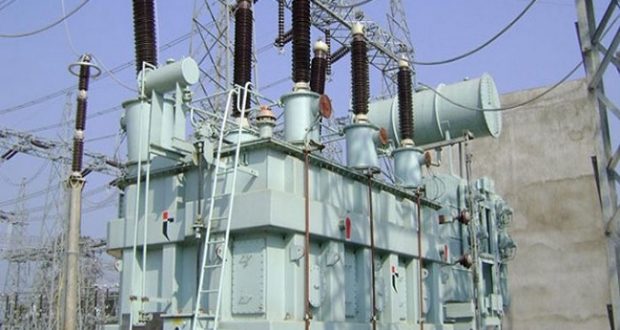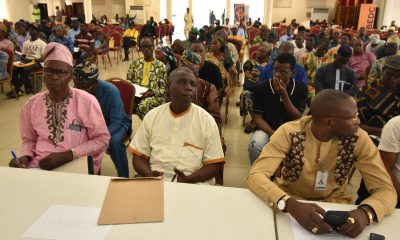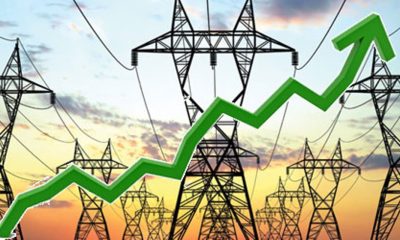News
Scientists Find Air As New Source Of Electricity

A team of scientists have discovered that electricity can be generated from water vapour or air.
A report of the European Union study on air-sourced electricity disclosed that water vapour or air can carry electrical charge.
CityMirrorNews learnt on Sunday that though there had been past efforts which resulted in some inroads, current breakthroughs present better results.
The project, called CATCHER, was funded by the European Innovation Council’s Pathfinder programme. It brought together eight partners from six countries in Europe to explore the possibility of getting electricity from air or water vapour.
A partner in CATCHER, Andriy Lyubchyk stated that the aim of the project is to expand a clean-energy mix by perfecting the conversion of atmospheric humidity into electricity.
Lyubchyk who is also the Chief Executive Officer of Portuguese start-up Cascatachuva Lda, said the technique involves harvesting the tiny charges of static electricity contained in gaseous water molecules, which, he stated are ubiquitous in the atmosphere.
He explained that the process is known as hygroelectricity or humidity electricity.
He said, ‘With this new renewable-energy source, we believe we will drastically increase the efficiency and the possibilities of the green-energy transition.’
The report stated that while the general idea might be the same, the particular technology used by CATCHER is very different to Tesla’s. It added that the project uses panel-like cells made from zirconium oxide – a hard crystalline material – to capture energy from atmospheric humidity.
The report said: “On thunderstorm in the air, zirconium oxide is a ceramic material widely used for such things as dental implants, advanced glass-like materials, electronics and cladding for nuclear fuel rods.
“When exploring the properties of nanomaterials made from zirconium oxide seven years ago, researchers started to see evidence of hygroelectricity, according to Svitlana Lyubchik, who coordinates CATCHER and is the mother of Andriy Lyubchyk.
“The researchers are now at the point where an 8-by-5-centimetre plate of their material can generate around 0.9 volt in a laboratory with a humidity of around 50%. This is comparable to the power output of half an AA battery.
“Working to make its hygroelectricity material more efficient, the team expects that, once perfected, the cells will be able to harvest the same amount of electricity as similar-sized photovoltaic cells.
“The researchers also believe that the cells will be deployed in a similar way to solar panels – either as large-scale electricity farms or as a power source for individual buildings.”
It added: “On steady states, the cells are created by producing very small, uniform nanoparticles of zirconium oxide and then compressing them into a sheet of material with a similar structure throughout including a series of channels, or capillaries.
“The nanostructure generates electrical fields inside the capillaries that separate the charge from water molecules absorbed from the atmosphere, according to Andriy Lyubchyk.
“The result is a cascade of physicochemical, physical and electrophysical processes that capture the electrical energy.
“In one respect, the new technology will have an advantage over solar and wind energy. While panels and turbines have to be positioned to capture sunlight and wind, hygroelectricity cells need no particular placement because little variation exists in local humidity levels.
“That said, hygroelectricity cells won’t necessarily be an option everywhere because they require minimum levels of humidity to work.
‘For example, if it is minus-15 degrees outside, so everything is frozen, there will be no water in the air,’ said Andriy Lyubchyk.”
The report in previous findings discovered that earth’s atmosphere is charged with electricity representing a potential renewable energy resource to help reduce dependence on fossil fuels.
It stated that in the early 1900s, Serbian-American inventor Nikola Tesla dreamed of harnessing energy from the air. It added that he ran a series of experiments trying to capture electrical charges from the atmosphere and transform them into an electric current.
According to it, since Tesla’s time, scientists have learned more about how electricity is formed and released in the atmosphere and discovered that water vapour can carry an electrical charge.
-

 News5 days ago
News5 days agoFIRAT Offers USD 200,000 SnapGenius Research Facility To Boost Research Excellence In African Universities
-

 News4 days ago
News4 days agoPolice Commence Investigation As Worshiper Mobbed To Death At Osogbo Central Mosque
-

 News5 days ago
News5 days agoPensioners Threaten Legal Action Against States Over Unpaid Pension Increases, Outstanding Entitlements
-

 News5 days ago
News5 days agoAPC Obokun Feud : FAS Sues For Peace, Urges Party Members To Embrace Dialogue














